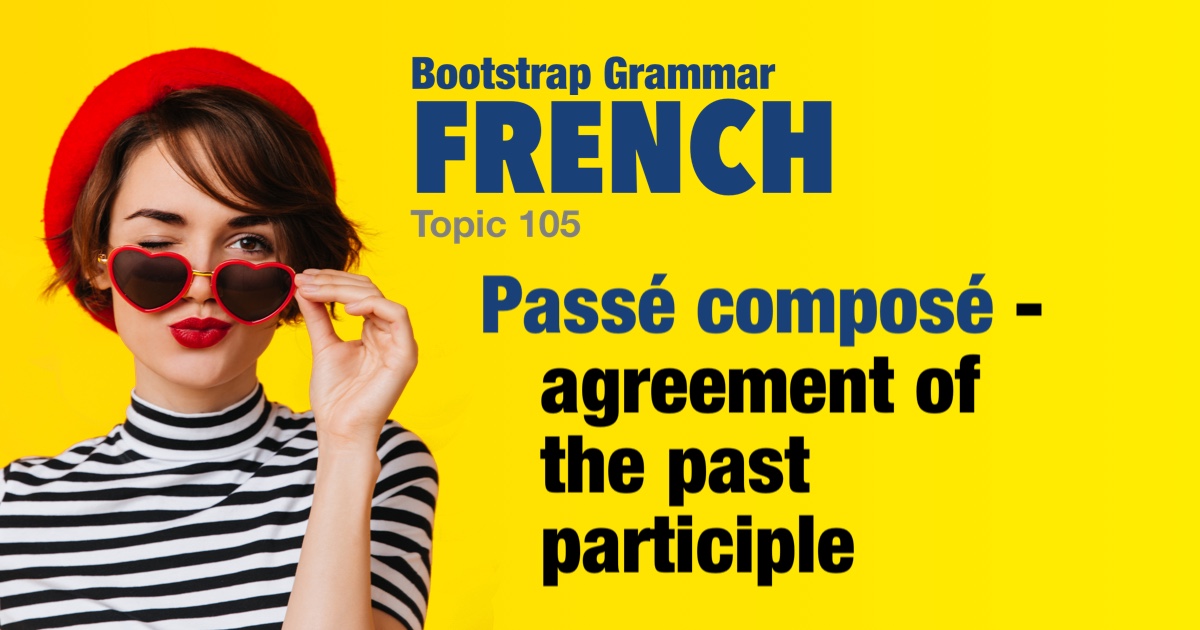French grammar - Passé composé - agreement of the past participle |
|||
|
|||
For sentences that take avoir in the passé composé the past participle should agree in gender and number if a direct object comes before the avoir + past participle pair. This direct object can take three possible forms: , • A direct object pronoun (me, te, le, la, nous, vous, les). • The subordinate clauses with relative pronoun que. • A noun placed before the verb (usually in questions and exclamations). This rule doesn't apply to indirect (dative) object pronouns. For agreement, past participles change in the same way that regular adjectives change: • Masculine singular - unchanged • Feminine singular - add -e • Masculine plural - add -s • Feminine plural - add -es Exceptions: There is no direct object agreement with the causative or passive. The example comments explain all this in detail. |
| Examples: | |
|
Il a vu ce film et elle l'a vu aussi.
He saw this movie and she saw it too.
|
|
|
Il a vu la montagne et elle l'a vue aussi.
He saw the mountain and she saw it too.
|
|
|
Il a vu les oiseaux et elle les a vus aussi.
He saw the birds and she saw them too.
|
|
|
Il a vu ses sœurs et elle les a vues aussi.
He saw his sisters and she saw them too.
|
|
|
Avez-vous regardé la nouvelle pièce de Molière ? - Oui, je l'ai regardée.
Have you (formal) seen Molière's new play? - Yes, I saw at it.
|
|
|
Je suis un homme et il m'a emmené au foot.
I am a man and he took me to football.
|
|
|
Je suis une femme et il m'a emmenée au parc.
I am a woman and he took me to the park.
|
|
|
Nous sommes des hommes et il nous a emmenés au pub.
We are men and he took us to the pub.
|
|
|
Nous sommes des femmes et il nous a emmenées dans les magasins.
We are women and he took us to the shops.
|
|
|
Et la télé ? - Il l'a regardée.
And the TV? - He watched it.
|
|
|
Et les bonbons ? - Elle les a mangés.
And the sweets? - She ate them.
|
|
|
Et les pompiers, tu les as vus ?
And the firefighters, have you (familiar) seen them?
|
|
|
Ces statues... Tu les as faites ?
These statues... Did you (familiar) make them?
|
|
|
A-t-il vu Marie ? Il l'a vue.
Has he seen Marie? He saw her.
|
|
|
Elle a acheté des livres. Elle les a achetés.
She bought books. She bought them.
|
|
|
Tu as perdu les clés. Tu les as perdues.
You (familiar) have lost the keys. You lost them.
|
|
|
Voici les livres qu'il m'a donnés.
Here are the books he gave me.
|
|
|
Les fleurs que j'ai senties.
The flowers that I smelled.
|
|
|
J'aime les fraises que Maman a cueillies.
I like the strawberries Mom picked.
|
|
|
J'ai rencontré les actrices que j'ai appréciées.
I met the actresses that I liked.
|
|
|
Les photos que tu as prises sont toutes floues.
The pictures you (familiar) took are all blurry.
|
|
|
As-tu lu les livres que j'ai achetés ?
Have you (familiar) read the books I bought?
|
|
|
Voilà la voiture qu'Amine a vendue.
This is the car that Amine sold.
|
|
|
Est-ce que Jean a trouvé ses livres ? Oui, enfin il les a trouvés.
Has Jean found his books? Yes, finally he found them.
|
|
|
As-tu lavé les chaises ? Lesquelles ? Celles que tu as laissées dans le jardin.
Did you (familiar) wash the chairs? Which ones? The ones you left in the garden.
|
|
|
Quelle revue Muriel a-t-elle achetée ?
What magazine did Muriel buy?
|
|
|
Elle a emmené les enfants à l'école.
She took the children to school.
|
|
|
Il les a fait travailler.
He made them work.
|
|
|
L'histoire que j'ai entendu lire.
The story that I heard read.
|
|
 |
|


 The direct object pronoun
The direct object pronoun 
